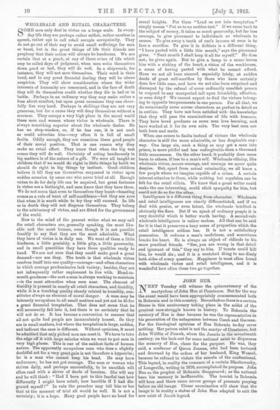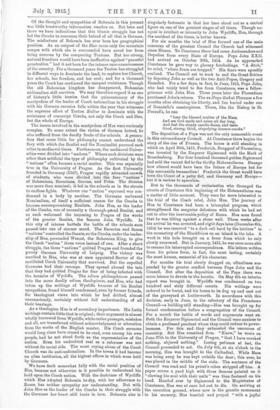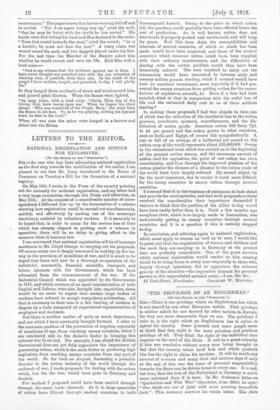JOHN HUS.
NEXT Tuesday will witness the quincentenary of the martyrdom of John Has at Constance. But for the war the event would have been appropriately commemorated both in Bohemia and in this country. Nevertheless there is a eertain fitness in this anniversary taking place in the midst of the greatest race-struggle known in history. To Bohemia the memory of Hus is dear because he was the representative in his generation of the antagonism between Czech and German. For the theological opinions of Hue Bohemia to-day cares nothing. Her patron saint is not the martyr of Constance, but John Mifflin of Pomuk, whom the Jesuits in the seventeenth century, on the look-out for some national saint to dispossess the memory of Hus, chose for the purpose. He was, they said, a confessor of Queen Joanna, who had been tortured and drowned by the orders of her husband, King Wenzel, because he refused to violate the secrets of the confessional. This legend, in reality the romance of a certain Dlauhowesky, of Lou geville, writing in 1670, accomplished its purpose. Joins Hus as the prophet of Bohemia disappeared; as the national hero his memory is ineffaceable. The tourist in Bohemia will here and there come across groups of peasants praying before an old image. Closer examination will show that the image is in reality a statue of John Hus adapted to suit the new saint of Jesuit legend.
Of the thought and sympathies of Bohemia in this present war little trustworthy information reaches us. But here and there we have indications that this titanic struggle has not led the Czechs to renounce their hatred of all that is German. The misfortune of Bohemia has ever been her geographical position. As an outpost of the Slav races only the mountain ranges with which she is surrounded have saved her from being overrun by the conquering Teutons. But her strong, natural frontiers would have been ineffective against "peaceful penetration " had it not been for the intense race-consciousness of the country. For a thousand years the Teuton has struggled in different ways to dominate the land, to capture her Church, her schools, her freedom, and her soul ; and for a thousand years the Czech has continued the unequal resistance. Though the old Bohemian kingdom has disappeared, Bohemian nationalism still survives. We may therefore regard it as one of history's little ironies that the quincentenary of the martyrdom of the leader of Czech nationalism in his struggle with his German enemies falls within the year that witnesses the supreme effort of Teuton Kultur to dominate with the assistance of conscript Czechs, not only the Czech and Slav, but the whole of Europe.
The issues involved in the martyrdom of Hue were curiously complex. To some extent the victim of German hatred, he also suffered from the deadly feuds of the schools. A genera- tion that cares little for philosophy cannot understand the fury with which the Realist and the Nominalist pursued each other in mediaeval times. Furthermore, the mediaeval Univer- sities were divided into "nations." Where such divisions were other than artificial the type of philosophy cultivated by the " nations " often became a racial matter. This was especially true in the University of Prague. As the first University founded in Germany (1347), Prague rapidly attraoted crowds of students, who were divided into the four "nation" of Bohemians, Bavarians, Saxons, and Poles. The division was more than nominal; it led in the schools as in the streets to endless fights. Whatever one " nation " espoused was con- demned in a body by another. The Germans embraced Nominalism, of itself a sufficient reason for the Czechs to become uncompromising Realists. John Hus, as the leader of the Czechs, was of necessity a thorough-paced Realist, and as such welcomed the incoming to Prague of the works of the greater Realist, the famous John Wycliffe. In this city of intense hatteds the battle of the schools soon passed into one of sterner mood. The Bavarian and Saxon "nations" controlled the Senate, so the Czechs, under the leader- ship of Hue, persuaded Wenzel, the Bohemian King, to give the Czech "nation" three votes instead of one. After a short struggle, the three " nations " quitted Prague and founded the purely German University of Leipzig. The victory was ascribed to Hue, who was at once appointed Rector of the mutilated Czech University that survived. But the expelled Germans bad their revenge. They spread abroad the tale that they had quitted Prague for fear of being infected with the heresies of Wycliffe. The odium philosophicum passed into the more deadly odium theologicunt, and Hue, who had taken up the writings of Wycliffe because of his Realist sympathies, found himself condemned, even by former friends, for theological views into which he had drifted, almost unconsciously, certainly without full understanding of all their bearings.
As a theologian Hue is of secondary importance. His Latin writings contain little that is original ; their argument is almost wholly borrowed from Wycliffe, while entire passages, mistakes and all, are transferred without acknowledgment or alteration from the works of the English master. His Czech sermons would long since have ceased to be read, even among his own people, had he not stood forth as the representative of the nation. Even his undoubted zeal as a reformer was not without its racial side. The most crying abuse of the Czech Church was its anti-nationalism. In the towns it had become an alien institution, all the highest offices in which were held by Germans. We have dealt somewhat fully with the racial position of Hue, because not otherwise is it possible to understand his hold upon the Czech nation. With the doctrines of Wycliffe which Hue adopted Bohemia to-day, with her adherence to Rome, has neither sympathy nor understanding. But with John Hue as the leader of the Czechs in their struggle with the Germans her heart still beats in love. Bohemia also is singularly fortunate in that her hero stood out as a central figure on one of the greatest stages of all times. Though un- equal in intellect or intensity to John Wycliffe, Hue, through the accident of the times, is better known.
For six months the trial of Hue formed one of the main concerns of the greatest Council the Church had witnessed since Nicaea. To Constance there had come Ambassadors and Deputies from every State of Europe. Pope John XXIL had arrived on October 28th, 1414. As he approached Constance he gave way to gloomy forebodings. "A ditch," he cried, "where foxes are trapped." His fears were speedily realized. The Council set to work to end the Great Schism by deposing John as well as the two Anti-Popes, Gregory and Benedict. For a few days, in fact, in June, 1415, Pope John, who had vainly tried to flee from Constance, was a fellow- prisoner with John Hus. Three years later the Florentines purchased John's release. The ex-Pope died at Florence a few months after obtaining his liberty, and lies buried under one of Donatello's masterpieces. There, like the Bishop in SL Praxed's, he can
"hear the blessed mutter of the Mass, And see God made and eaten all day long, And feel the steady oandle-ilame, and taste Good, strong, thick, stupefying incense-smoke."
The deposition of a Pope was not the only memorable event in this extraordinary Council. At Constance there begins the story of the rise of Prussia. The house is still standing in which on April 30th, 1415, Frederick, Burggraf of Nuremberg, was invested by the Emperor Sigismund with the Mark of Brandenburg. For four hundred thousand gulden Sigismund had sold the vacant fief to the thrifty Hohenzollern. Strange how altered would have been the future of Europe but for this mercantile transaction! Frederick the Great would have been the Count of a petty fief, and Germany and Europe— but it is useless to speculate.
But to the thousands of ecclesiastics who thronged the streets of Constance this beginning of the Hohenzollern was a matter of little moment. They were far more interested in the trial of the Czech rebel, John Hus. The journey of Hus to Constance had been a triumphal progress, which strengthened the sanguine delusions with which he had set out to alter the irrevocable policy of Rome. Hue soon found that he was tilting against a stone wall. Three weeks after his arrival he was arrested, and eight days later (December 6th,
1414) be was removed "to a dark cell hard by the latrines" is the monastery of the Blackfriare on an island in the lake. A week in this hole brought on a fever from which he only slowly recovered. But in January, 1415, he was once more able to resume his interrupted correspondence. His letters written from his prison form, in fact, the most lasting, certainly the most human, memorial of his character.
For months his trial slowly dragged on, oftentimes sus- pended by the greater conflict between Pope John and the Council. But after the deposition of the Pope there was more leisure to devote to the heretic. On May 4th an interim report was brought in. Wycliffe was condemned on two hundred and sixty different counts. His writings were ordered to be burnt, and his bones to be dug up and cast out of the graveyard at Lutterwortb. In accordance with this decision, early in June, in the refectory of the Franciscan Council—a building still standing—Hue was brought up for formal condemnation before a congregation of the Council. For a month the battle of words and arguments went on.
Both the Emperor Sigismund and the Council were anxious to obtain a professed penitent whom they could reduce to power- lessness. For this end they exhausted the resources of casuistry. But Hue remained firm. "Know," he wrote on June 27th to the University of Prague, "that I have revoked nothing, abjured nothing." Losing patience at last, the Council proceeded to act. On July 6th, at six o'clock in the morning, Hus was brought to the Cathedral. While Mass was being sung he was kept outside the door; this over, he was placed in the middle of the aisle. The sentenoe of the Council was read and his priest's robes stripped off him. A paper crown a yard high with three demons painted on it " clawing his soul with their nails " was then fastened on his head. Handed over by Sigismund to the Magistrates of Constance, Hue was at once led out to die. On arriving at the execution ground, where now is the granite monument to his memory, Hue kneeled and prayed " with a joyful countenance." The paper crown that he was wearing fell off and he smiled. "Put it on again wrong way up," cried the mob, "that he may be burnt with the devils he has served." His hands were tied behind his back and Hus fastened to the stake.
" Turn him round towards the west," cried the crowd ; " he is a heretic ; be must not face the east," A rusty chain was wound round his neck, and two faggots placed under his feet, For the last time the Marshal of the Empire asked him whether he would recant and save his life. Said. Hus with a loud voice
"God is my witness that the evidence against me is false. have never thought nor preached save with the one intention of winning men, if possible, from their sins. In the truth of the gospel I have written, taught, and preached, to-day I will gladly die,
So they heaped three cartloads of straw and wood around and poured pitch thereon. When the flames were lighted,
"be sang twice, with a loud voice : Christ, Thou Son of the Living God, have mercy upon me.' When ho began the third clause: 'Who was conceived of the Virgin Mary,' the wind blew the flames in his face. So, as he was praying, moving his lips and head, he died in the Lord,"
When all was over the ashes were heaped in a barrow and tilted into the Rhine.












































 Previous page
Previous page